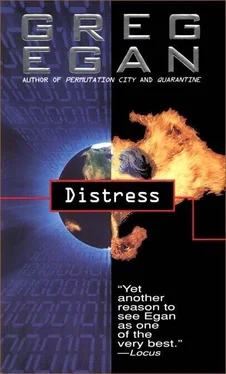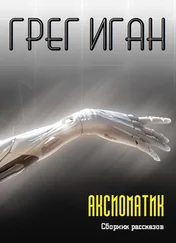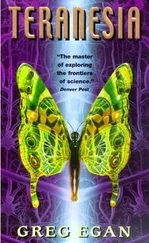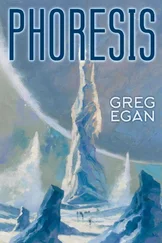Грег Иган - Distress
Здесь есть возможность читать онлайн «Грег Иган - Distress» весь текст электронной книги совершенно бесплатно (целиком полную версию без сокращений). В некоторых случаях можно слушать аудио, скачать через торрент в формате fb2 и присутствует краткое содержание. Жанр: Фантастика и фэнтези, на английском языке. Описание произведения, (предисловие) а так же отзывы посетителей доступны на портале библиотеки ЛибКат.
- Название:Distress
- Автор:
- Жанр:
- Год:неизвестен
- ISBN:нет данных
- Рейтинг книги:3 / 5. Голосов: 1
-
Избранное:Добавить в избранное
- Отзывы:
-
Ваша оценка:
- 60
- 1
- 2
- 3
- 4
- 5
Distress: краткое содержание, описание и аннотация
Предлагаем к чтению аннотацию, описание, краткое содержание или предисловие (зависит от того, что написал сам автор книги «Distress»). Если вы не нашли необходимую информацию о книге — напишите в комментариях, мы постараемся отыскать её.
Distress — читать онлайн бесплатно полную книгу (весь текст) целиком
Ниже представлен текст книги, разбитый по страницам. Система сохранения места последней прочитанной страницы, позволяет с удобством читать онлайн бесплатно книгу «Distress», без необходимости каждый раз заново искать на чём Вы остановились. Поставьте закладку, и сможете в любой момент перейти на страницу, на которой закончили чтение.
Интервал:
Закладка:
"That’s a complicated question. For a start, it depends what you mean by function. "
"You can live outside of institutions. You can hold down skilled jobs." Rourke’s main occupation was research assistant to an academic linguist—not exactly sheltered employment.
He said, "Of course. If we couldn’t, we’d be classified as fully autistic. That’s the criterion which defines partial autism : we can survive in ordinary society. Our deficiencies aren’t overwhelming—and we can usually fake a lot of what’s missing. Sometimes we can even convince ourselves that nothing’s wrong. For a while."
"For a while? You have jobs, money, independence. What else does it take to function! "
"Interpersonal relationships."
"You mean sexual relationships?"
"Not necessarily. But they are the most difficult. And the most… illuminating."
He touched a key on his notepad; a complex neural map appeared. "Everyone—or almost everyone—instinctively attempts to understand other human beings. To guess what they’re thinking. To anticipate their actions. To… know them. People build symbolic models of other people in their brains, both to act as coherent representations, tying together all the information which can actually be observed—speech, gestures, past actions—and to help make informed guesses about the aspects which can’t be known directly—motives, intentions, emotions." As he spoke, the neural map dissolved, and re-formed as a functional diagram of a "third person" model: an elaborate network of blocks labeled with objective and subjective traits.
"In most people, all of this happens with little or no conscious effort: there’s an innate ability to model other people. It’s refined by use in childhood—and total isolation would cripple its development… in the same way as total darkness would cripple the visual centers. Short of that kind of extreme abuse, though, upbringing isn’t a factor. Autism can only be caused by congenital brain damage, or later physical injuries to the brain. There are genetic risk factors which involve susceptibility to viral infections in utero— but autism itself is not a simple hereditary disease."
I’d already filmed a white-coated expert saying much the same things, but VA members' detailed knowledge of their own condition was a crucial part of the story… and Rourke’s explanation was clearer than the neurologist’s.
"The brain structure involved occupies a small region in the left frontal lobe. The specific details describing individual people are scattered throughout the brain—like all memories—but this structure is the one place where those details are automatically integrated and interpreted. If it’s damaged, other people’s actions can still be perceived and remembered— but they lose their special significance. They don’t generate the same kind of obvious implications; they don’t make the same kind of immediate sense." The neural map reappeared—this time with a lesion. Again, it was transformed into a functional diagram—now visibly disrupted, overlayed with dozens of dashed red lines to illustrate lost connections.
Rourke continued, "The structure in question probably began to evolve toward its modern human form in the primates, though it had precursors in earlier mammals. It was first identified and studied—in chimpanzees—by a neuroscientist called Lament, in 2014. The corresponding human version was mapped a few years later.
"Maybe the first crucial role for Lament’s area was to help make deception possible—to learn how to hide your own true motives, by understanding how others perceive you. If you know how to appear to be servile or cooperative—whatever’s really on your mind—you have a better chance of stealing food, or a quick fuck with someone else’s partner. But then… natural selection would have upped the ante, and favored those who could see through the ruse. Once lying had been invented, there was no turning back. Development would have snowballed."
I said, "So the fully autistic can’t lie—or judge someone else to be lying. But the partially autistic…?"
"Some can, some can’t. It depends on the specific damage. We’re not all identical."
"Okay. But what about relationships?"
Rourke averted his gaze, as if the subject was unbearably painful—but he continued without hesitation, sounding like a fluent public speaker delivering a familiar lecture. "Modeling other people successfully can aid cooperation, as well as deception. Empathy can act to improve social cohesion at every level. But as early humans evolved a greater degree of monogamy—at least, compared to their immediate ancestors—the whole cluster of mental processes involved in pair-bonding would have become entangled. Empathy for your breeding partner attained a special status: their life could be, in some circumstances, as crucial to the passing on of your genes as your own.
"Of course, most animals will instinctively protect their young, or their mates, at a cost to themselves; altruism is an ancient behavioral strategy. But how could instinctive altruism be made compatible with human self-awareness? Once there was a burgeoning ego, a growing sense of self in the foreground of every action, how was it prevented from overshadowing everything else?
"The answer is, evolution invented intimacy. Intimacy makes it possible to attach some, or all, of the compelling qualities associated with the ego—the model of the self—to models of other people. And not just possible—pleasurable. A pleasure reinforced by sex, but not restricted to the act, like orgasm. And not even restricted to sexual partners, in humans. Intimacy is just the belief—rewarded by the brain—that you know the people you love in almost the same fashion as you know yourself."
The word "love" had come as a shock, in the middle of all that socio-biology. But he’d used it without a hint of irony or self-consciousness—as if he’d seamlessly merged the vocabularies of emotion and evolution into a single language.
I said, "And even partial autism makes that impossible? Because you can’t model anyone well enough to really know them at all?"
Rourke didn’t believe in yes-or-no answers. "Again, we’re not all identical. Sometimes the modeling is accurate enough—as accurate as anyone’s—but it’s not rewarded: the parts of Laments area which make most people feel good about intimacy, and actively seek it out, are missing. Those people are considered to be cold, aloof. And sometimes the reverse is true: people are driven to seek intimacy, but their modeling is so poor that they can never hope to find it. They might lack the social skills to form lasting sexual relationships—or even if they’re intelligent and resourceful enough to circumvent the social problems, the brain itself might judge the model to be faulty, and refuse to reward it. So the drive is never satisfied—because it’s physically impossible for it to be satisfied."
I said, "Sexual relationships are difficult for everyone. It has been suggested that you’ve merely invented a neurological syndrome which allows you to abdicate responsibility for problems which everyone faces, as a matter of course."
Rourke stared down at the floor and smiled indulgently. "And we should just pull ourselves together, and try harder?"
"Either that, or have autografts to correct the damage." A small number of neurons and glial cells could be removed from the brain without harm, regressed to an embryonic state, multiplied in tissue culture, then reinjected into the damaged region. Artificially maintained gradients of embryonic marker hormones could fool the cells into thinking that they were back in the developing brain, and guide them through a fresh attempt to build the necessary synaptic connections. The success rate was unimpressive for the fully autistic—but for people with relatively small lesions, it was close to forty percent.
Читать дальшеИнтервал:
Закладка:
Похожие книги на «Distress»
Представляем Вашему вниманию похожие книги на «Distress» списком для выбора. Мы отобрали схожую по названию и смыслу литературу в надежде предоставить читателям больше вариантов отыскать новые, интересные, ещё непрочитанные произведения.
Обсуждение, отзывы о книге «Distress» и просто собственные мнения читателей. Оставьте ваши комментарии, напишите, что Вы думаете о произведении, его смысле или главных героях. Укажите что конкретно понравилось, а что нет, и почему Вы так считаете.










![Грег Иган - Рассказы [компиляция]](/books/419837/greg-igan-rasskazy-kompilyaciya-thumb.webp)
